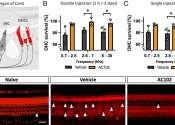Novel compound AC102 restores hearing in preclinical models of sudden hearing loss
A single application of the novel compound AC102 almost completely restores noise-induced hearing loss in preclinical models. This is the key finding of a recent publication in the Proceedings of the National Academy of Sciences ...
Apr 2, 2024
0
40









